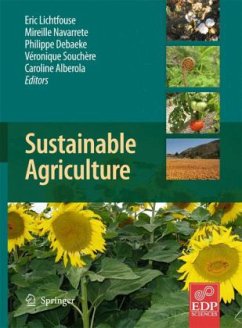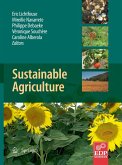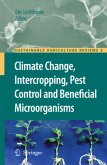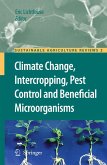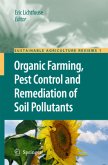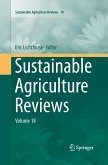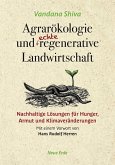Sustainability rests on the principle that we must meet the needs of the present without compromising the ability of future generations to meet their own needs. Starving people in poor nations, obesity in rich nations, increasing food prices, on-going climate changes, increasing fuel and transportation costs, flaws of the global market, worldwide pesticide pollution, pest adaptation and resistance, loss of soil fertility and organic carbon, soil erosion, decreasing biodiversity, desertification, and so on. Despite unprecedented advances in sciences allowing to visit planets and disclose subatomic particles, serious terrestrial issues about food show clearly that conventional agriculture is not suited any longer to feed humans and to preserve ecosystems. Sustainable agriculture is an alternative for solving fundamental and applied issues related to food production in an ecological way. While conventional agriculture is driven almost solely by productivity and profit, sustainable agriculture integrates biological, chemical, physical, ecological, economic and social sciences in a comprehensive way to develop new farming practices that are safe and do not degrade our environment. In that respect, sustainable agriculture is not a classical and narrow science. Instead of solving problems using the classical painkiller approach that treats only negative impacts, sustainable agriculture treats problem sources. As most actual society issues are now intertwined, global, and fast-developing, sustainable agriculture will bring solutions to build a safer world.
This book gathers review articles that analyze current agricultural issues and knowledge, then propose alternative solutions. It will therefore help all scientists, decision-makers, professors, farmers and politicians who wish to build a safe agriculture, energy and food system for future generations.
This book gathers review articles that analyze current agricultural issues and knowledge, then propose alternative solutions. It will therefore help all scientists, decision-makers, professors, farmers and politicians who wish to build a safe agriculture, energy and food system for future generations.
From the reviews:
"This work is a collection of literature reviews on a wide variety of topics pertinent to sustainable agriculture. ... provides an excellent overview to many of the current trends in sustainable agriculture. ... the compilation of the papers in one volume is an attractive feature, especially for researchers interested in an accessible reference guide. ... Summing Up: Highly recommended. Graduate students, researchers, faculty, and professionals." (J. R. Reeve, Choice, Vol. 47 (11), July, 2010)
"This work is a collection of literature reviews on a wide variety of topics pertinent to sustainable agriculture. ... provides an excellent overview to many of the current trends in sustainable agriculture. ... the compilation of the papers in one volume is an attractive feature, especially for researchers interested in an accessible reference guide. ... Summing Up: Highly recommended. Graduate students, researchers, faculty, and professionals." (J. R. Reeve, Choice, Vol. 47 (11), July, 2010)

